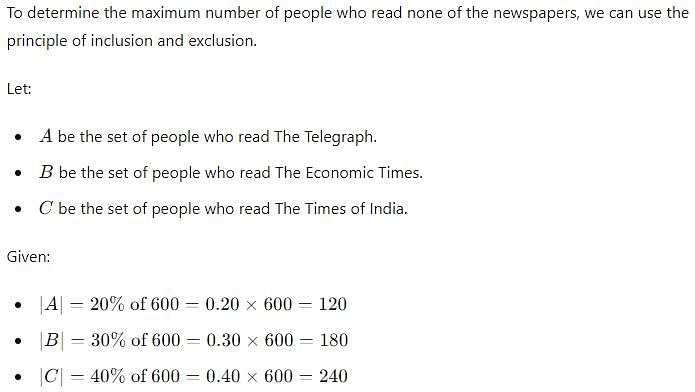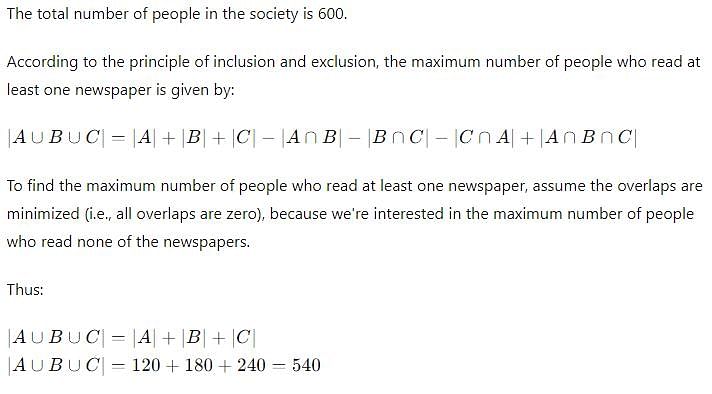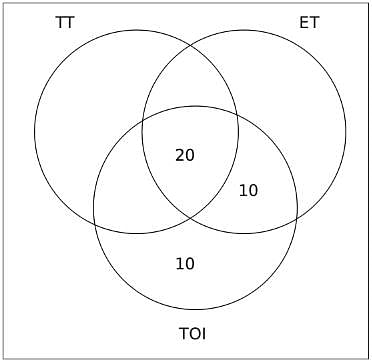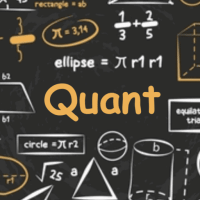CAT Exam > CAT Questions > A survey was conducted in a society to get an...
Start Learning for Free
A survey was conducted in a society to get an estimate of how many people read the following newspapers, The Telegraph, The Economic Times and The Times of India. It was found out that 20% of people of the society read The Telegraph, 30% of people of the society read The Economic Times and 40% of the people of the society read The Times of India. If the society had a total of 600 people, what can be the maximum number of people in the society who read none of the newspapers?
Correct answer is '60'. Can you explain this answer?
| FREE This question is part of | Download PDF Attempt this Test |
Verified Answer
A survey was conducted in a society to get an estimate of how many peo...



Most Upvoted Answer
A survey was conducted in a society to get an estimate of how many peo...
Given information:
- The survey was conducted in a society.
- The society has a total of 600 people.
- 20% of people read The Telegraph.
- 30% of people read The Economic Times.
- 40% of people read The Times of India.
Objective:
To find the maximum number of people in the society who read none of the newspapers.
Calculation:
Let's calculate the number of people who read each newspaper:
- The number of people who read The Telegraph = 20% of 600 = (20/100) * 600 = 120
- The number of people who read The Economic Times = 30% of 600 = (30/100) * 600 = 180
- The number of people who read The Times of India = 40% of 600 = (40/100) * 600 = 240
To find the maximum number of people who read none of the newspapers, we need to subtract the total number of people who read each newspaper from the total number of people in the society.
Total number of people who read at least one newspaper = Number of people who read The Telegraph + Number of people who read The Economic Times + Number of people who read The Times of India
= 120 + 180 + 240 = 540
Therefore, the maximum number of people who read none of the newspapers = Total number of people in the society - Total number of people who read at least one newspaper
= 600 - 540 = 60
Conclusion:
The maximum number of people in the society who read none of the newspapers is 60.
- The survey was conducted in a society.
- The society has a total of 600 people.
- 20% of people read The Telegraph.
- 30% of people read The Economic Times.
- 40% of people read The Times of India.
Objective:
To find the maximum number of people in the society who read none of the newspapers.
Calculation:
Let's calculate the number of people who read each newspaper:
- The number of people who read The Telegraph = 20% of 600 = (20/100) * 600 = 120
- The number of people who read The Economic Times = 30% of 600 = (30/100) * 600 = 180
- The number of people who read The Times of India = 40% of 600 = (40/100) * 600 = 240
To find the maximum number of people who read none of the newspapers, we need to subtract the total number of people who read each newspaper from the total number of people in the society.
Total number of people who read at least one newspaper = Number of people who read The Telegraph + Number of people who read The Economic Times + Number of people who read The Times of India
= 120 + 180 + 240 = 540
Therefore, the maximum number of people who read none of the newspapers = Total number of people in the society - Total number of people who read at least one newspaper
= 600 - 540 = 60
Conclusion:
The maximum number of people in the society who read none of the newspapers is 60.
Community Answer
A survey was conducted in a society to get an estimate of how many peo...
Let the newspapers be abbreviated as follows:
The Telegraph - TT
The Economic Times - ET
The Times of India - TOI
Let the number of people in the society be 100 (only for calculation, later we will substitute the correct value)
Therefore, n(TT) = 20
n(ET) = 30
n(TOI) = 40
To maximise the number of people reading no newspaper, we will have to maximise the number of people who read 3 and 2 newspapers as follows.
The Telegraph - TT
The Economic Times - ET
The Times of India - TOI
Let the number of people in the society be 100 (only for calculation, later we will substitute the correct value)
Therefore, n(TT) = 20
n(ET) = 30
n(TOI) = 40
To maximise the number of people reading no newspaper, we will have to maximise the number of people who read 3 and 2 newspapers as follows.

Hence, maximum number of people who read no newspapers = 60 = 60%.
Total number of people in the society = 600
Hence, the maximum number of people in the society who read none of the newspapers = 0.6 x 600 = 360
Total number of people in the society = 600
Hence, the maximum number of people in the society who read none of the newspapers = 0.6 x 600 = 360
Attention CAT Students!
To make sure you are not studying endlessly, EduRev has designed CAT study material, with Structured Courses, Videos, & Test Series. Plus get personalized analysis, doubt solving and improvement plans to achieve a great score in CAT.

|
Explore Courses for CAT exam
|

|
Similar CAT Doubts
A survey was conducted in a society to get an estimate of how many people read the following newspapers, The Telegraph, The Economic Times and The Times of India. It was found out that 20% of people of the society read The Telegraph, 30% of people of the society read The Economic Times and 40% of the people of the society read The Times of India. If the society had a total of 600 people, what can be the maximum number of people in the society who read none of the newspapers?Correct answer is '60'. Can you explain this answer?
Question Description
A survey was conducted in a society to get an estimate of how many people read the following newspapers, The Telegraph, The Economic Times and The Times of India. It was found out that 20% of people of the society read The Telegraph, 30% of people of the society read The Economic Times and 40% of the people of the society read The Times of India. If the society had a total of 600 people, what can be the maximum number of people in the society who read none of the newspapers?Correct answer is '60'. Can you explain this answer? for CAT 2024 is part of CAT preparation. The Question and answers have been prepared according to the CAT exam syllabus. Information about A survey was conducted in a society to get an estimate of how many people read the following newspapers, The Telegraph, The Economic Times and The Times of India. It was found out that 20% of people of the society read The Telegraph, 30% of people of the society read The Economic Times and 40% of the people of the society read The Times of India. If the society had a total of 600 people, what can be the maximum number of people in the society who read none of the newspapers?Correct answer is '60'. Can you explain this answer? covers all topics & solutions for CAT 2024 Exam. Find important definitions, questions, meanings, examples, exercises and tests below for A survey was conducted in a society to get an estimate of how many people read the following newspapers, The Telegraph, The Economic Times and The Times of India. It was found out that 20% of people of the society read The Telegraph, 30% of people of the society read The Economic Times and 40% of the people of the society read The Times of India. If the society had a total of 600 people, what can be the maximum number of people in the society who read none of the newspapers?Correct answer is '60'. Can you explain this answer?.
A survey was conducted in a society to get an estimate of how many people read the following newspapers, The Telegraph, The Economic Times and The Times of India. It was found out that 20% of people of the society read The Telegraph, 30% of people of the society read The Economic Times and 40% of the people of the society read The Times of India. If the society had a total of 600 people, what can be the maximum number of people in the society who read none of the newspapers?Correct answer is '60'. Can you explain this answer? for CAT 2024 is part of CAT preparation. The Question and answers have been prepared according to the CAT exam syllabus. Information about A survey was conducted in a society to get an estimate of how many people read the following newspapers, The Telegraph, The Economic Times and The Times of India. It was found out that 20% of people of the society read The Telegraph, 30% of people of the society read The Economic Times and 40% of the people of the society read The Times of India. If the society had a total of 600 people, what can be the maximum number of people in the society who read none of the newspapers?Correct answer is '60'. Can you explain this answer? covers all topics & solutions for CAT 2024 Exam. Find important definitions, questions, meanings, examples, exercises and tests below for A survey was conducted in a society to get an estimate of how many people read the following newspapers, The Telegraph, The Economic Times and The Times of India. It was found out that 20% of people of the society read The Telegraph, 30% of people of the society read The Economic Times and 40% of the people of the society read The Times of India. If the society had a total of 600 people, what can be the maximum number of people in the society who read none of the newspapers?Correct answer is '60'. Can you explain this answer?.
Solutions for A survey was conducted in a society to get an estimate of how many people read the following newspapers, The Telegraph, The Economic Times and The Times of India. It was found out that 20% of people of the society read The Telegraph, 30% of people of the society read The Economic Times and 40% of the people of the society read The Times of India. If the society had a total of 600 people, what can be the maximum number of people in the society who read none of the newspapers?Correct answer is '60'. Can you explain this answer? in English & in Hindi are available as part of our courses for CAT.
Download more important topics, notes, lectures and mock test series for CAT Exam by signing up for free.
Here you can find the meaning of A survey was conducted in a society to get an estimate of how many people read the following newspapers, The Telegraph, The Economic Times and The Times of India. It was found out that 20% of people of the society read The Telegraph, 30% of people of the society read The Economic Times and 40% of the people of the society read The Times of India. If the society had a total of 600 people, what can be the maximum number of people in the society who read none of the newspapers?Correct answer is '60'. Can you explain this answer? defined & explained in the simplest way possible. Besides giving the explanation of
A survey was conducted in a society to get an estimate of how many people read the following newspapers, The Telegraph, The Economic Times and The Times of India. It was found out that 20% of people of the society read The Telegraph, 30% of people of the society read The Economic Times and 40% of the people of the society read The Times of India. If the society had a total of 600 people, what can be the maximum number of people in the society who read none of the newspapers?Correct answer is '60'. Can you explain this answer?, a detailed solution for A survey was conducted in a society to get an estimate of how many people read the following newspapers, The Telegraph, The Economic Times and The Times of India. It was found out that 20% of people of the society read The Telegraph, 30% of people of the society read The Economic Times and 40% of the people of the society read The Times of India. If the society had a total of 600 people, what can be the maximum number of people in the society who read none of the newspapers?Correct answer is '60'. Can you explain this answer? has been provided alongside types of A survey was conducted in a society to get an estimate of how many people read the following newspapers, The Telegraph, The Economic Times and The Times of India. It was found out that 20% of people of the society read The Telegraph, 30% of people of the society read The Economic Times and 40% of the people of the society read The Times of India. If the society had a total of 600 people, what can be the maximum number of people in the society who read none of the newspapers?Correct answer is '60'. Can you explain this answer? theory, EduRev gives you an
ample number of questions to practice A survey was conducted in a society to get an estimate of how many people read the following newspapers, The Telegraph, The Economic Times and The Times of India. It was found out that 20% of people of the society read The Telegraph, 30% of people of the society read The Economic Times and 40% of the people of the society read The Times of India. If the society had a total of 600 people, what can be the maximum number of people in the society who read none of the newspapers?Correct answer is '60'. Can you explain this answer? tests, examples and also practice CAT tests.

|
Explore Courses for CAT exam
|

|
Suggested Free Tests
Signup for Free!
Signup to see your scores go up within 7 days! Learn & Practice with 1000+ FREE Notes, Videos & Tests.
























